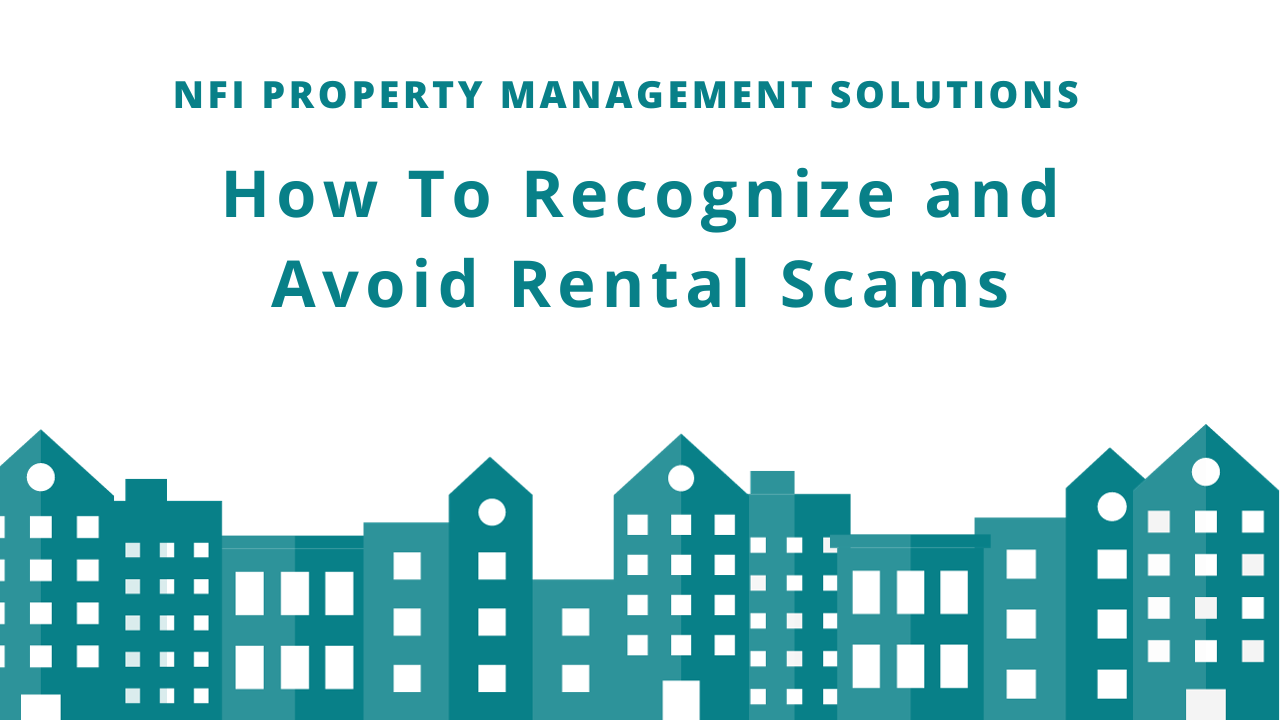
Investing in a rental property can be a lucrative and rewarding venture. However, it doesn’t come without risks. One of the biggest challenges landlords face is the risk of rental scams. This type of scam has been on the rise in recent years, so it’s important to know how to recognize them.
Scammers can impersonate potential renters and property managers or even use pictures of your property to create fake listings. Falling for a rental scam can cost you a lot of money or even your reputation.
To help you avoid rental scams, the experts at NFI Property Management Solutions have written this guide. We’ll go over the most common rental scams and how to spot them.
Common Rental Scams and How Landlords Can Recognize Them
The best way to avoid rental scams is to know how common scams work. Below are some of the most common rental scams landlords should be aware of.
1. Fake Listings
In an attempt to trick renters, scammers can use the photos and information of your rental property to create a fake listing. After posing as the landlord for your property, scammers will go on to “rent” the property, requesting a deposit from prospective renters to secure the unit.

After collecting the payments, the scammer will stop contact. In most cases, this is when tenants realize they’ve been scammed. However, there’s the risk that they don’t realize they fell for a scam and show up at your property.
This cannot only be an inconvenience for your tenants but also damage your reputation as a landlord, as the affected party could take to social media to warn others not to rent your property.
The best way to avoid this scam is to regularly monitor popular rental listing websites. If you come across any fake listings of your property, report them immediately so the real estate website can take them down.
2. Fake Tenant Applications
Sometimes scammers will pose as prospective renters. They do so by submitting a fake application for your rental filled with fake information and references. Falling for such a scam can cost you huge losses since they leave your investment vulnerable to property damage and the risk of eviction.
They will often provide fake employment and income documentation to create the illusion of financial stability. This can lead to constant late or missed rent payments, which will significantly affect your income and stability.

To avoid falling for this, you must have an extensive tenant screening process in place. By conducting comprehensive background checks, verifying all the information provided in the application, and contacting references, you can reduce the risk of accepting a fake rental application.
3. Prospective Tenant Overpays You
Another popular rental scam involves scammers posing as prospective renters who offer to pay you several months of rent upfront, along with some extra money for property expenses. These scammers will then send a check for more than the agreed-upon amount and request that the excess funds be returned.
Given that the initial check is fake, you’ll be left paying the “excess funds” out of your own pocket, meaning a considerable financial loss for you.
This is a common technique of scammers. We recommend always rejecting tenants' offers to overpay you. You should also be cautious of refund requests on rental payments. If you ever need to make a refund, make sure to check the authenticity of the check you’ve received.
4. Illegal Subletting
Some scammers rent properties and then sublet them to unsuspecting tenants without the landlord’s knowledge or approval. This allows scammers to earn money by charging a higher rent than what they’re paying to the actual owner of the property.

However, this puts your rental at risk of property damage since scammers most likely won’t conduct a screening process.
The best way to avoid this kind of scam is to clearly outline your subletting policies on the lease. If your lease says you don’t authorize subletting of any kind, you’ll have legal grounds to evict and sue any tenant who tries to sublet your rental without your knowledge.
We recommend that you conduct regular property inspections. This will not only help you ensure your rental is in good condition but can also help you spot subtenants before it’s too late.
5. Break the Lease Early Without Paying Penalties
Some tenants may sign a lease agreement with the intention of breaking it prematurely. When it’s time for them to move out, they may provide false reasons or come up with fabricated emergencies to justify breaking the lease early without paying any fees or penalties.
Some tenants might even demand a refund of their security deposit. This will leave you with a vacant property and at a financial loss.
To avoid lease-breaking scams, it’s essential that you know the justified and unjustified reasons for breaking a lease in your state. It’s also important to remember that tenants must provide proof that they have a justified reason for ending their rental agreement prematurely.

We suggest that you add an early lease termination clause to all your leases. This will allow both you and your renters to end a lease early if both of you agree to it. Plus, you can add fees or conditions for early lease termination, which can reduce the likelihood of scams.
Bottom Line
Recognizing and avoiding rental scams is crucial for landlords. Knowing about common scams and conducting due diligence, comprehensive tenant screening, and open communication with prospective tenants are key to reducing the risk of falling for a fraudulent scheme.
Now that you know how to recognize and avoid rental scams, you can protect your investment and reputation as a landlord.
Need help keeping your rental investment protected? Contact NFI Property Management Solutions! With over 30 years in the Pensacola rental market, we know how to spot common scams. With us by your side, you can rest assured your property will always be safe.
Disclaimer: This blog isn’t a substitute for expert legal advice. Also, laws change, and this post might not be updated at the time of your reading. If you have any legal questions or concerns please reach out to a licensed attorney.